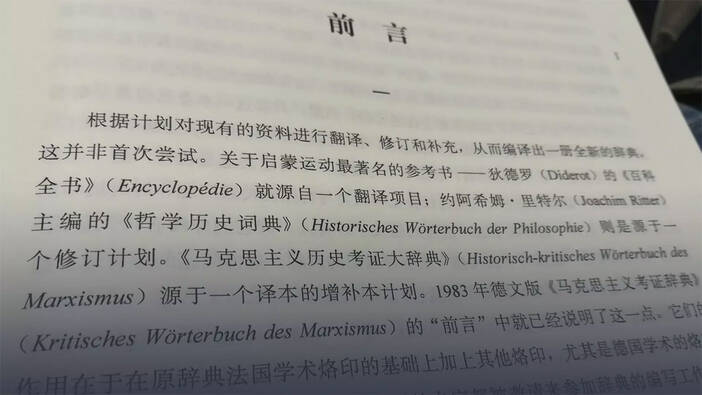
The Historical-Critical Dictionary of Marxism (HCDM) is a comprehensive Marxist lexicon which, upon completion, will span 15 volumes and over 1,500 entries. Of the nine volumes published so far in the original German, two volumes have been published in Chinese since 2017. In 2019, the Rosa-Luxemburg-Stiftung teamed up with the HCDM team to advance its "globalization" into English and Spanish, with the ultimate aim of recruiting a new generation of Marxist scholars from around the globe to the project and expanding its readership and reach. The below entry is one of a selection of these translations that are made available on our website.
For more information about the project and other translated entries, check out our HCDM dossier.
A: muǧtama‛ lāṭabaqī. — F: société sans classes. — G: Klassenlose Gesellschaft. — R: besklassovoe obščestvo. — S: sociedad sin clases. — C: wujieji shehui 无阶级社会
I.
The vision of a CS or the desire to build one is as old as the class division of society itself. We find it in Jewish prophets, Chinese scholars, and ancient Greek poets long before the common era. It also played a role for most of the so-called utopian socialists and early communists, such as Gracchus Babeuf. All of these authors are concerned with the absence or abolition of private property, conditions of far-reaching social and economic equality, and extensive cooperation in production and everyday life. By contrast, political relations within the thus conceptualized CS have been thought about in very different ways among the different authors and schools. In some, there rules a strict dictatorship of reason, as in Plato and Thomas More. In others, the state and coercion have practically disappeared, as in Charles Fourier’s phalanstery or Wilhelm Weitling’s communist settlements. With the passage from utopian to scientific socialism effected by Marx, Engels, and their most important students, the vision of the end goal changes. This remains the CS, which is expected to overcome the most important social ills of the society divided into classes – exploitation, oppression, violence between people, alienation of labour, isolation of people, the stunting of human capabilities, etc.
1. Insofar as class rule is based on private ownership of the means of production, CS, that is, socialism, is closely connected to the collective appropriation of these means. But this end goal is no longer seen as the implementation of a plan or model whose details have been worked out in advance. That is why such models are fully absent in the works of Marx and Engels, and why one will search in vain for >recipes […] for the cook-shops of the future< (C I, 99 [MEW 23/25]). The historical development itself is declared to be the main source of the future society. Above all, it becomes a question of investigating how, >within the framework of the old society< (MECW 29/263 [13/9]) itself, powers and developmental tendencies are released that generate the historical possibility of a CS. The most important of these are: the development of the forces of production, which allow for universal prosperity, that is, the satisfaction of basic needs through material goods; labour-saving technology that replaces non-productive, mechanical labour with machines; the freeing up of a growing share of life time, which is liberated from the necessity of engaging in subsistence labour; the tendency toward the objective socialization of labour (cooperation); the growing internationalization of economic life; the rising level of education and qualification of the producers; the increasing unification of culture on a global scale; the material possibility of transcending every class and group monopoly over culture, knowledge, information, etc; the emergence of a social class – the modern proletariat – that disposes of the positive abilities required to reorganize society on the basis of a free association (associated production and social self-administration). The creation of CS is conceptualized as the final outcome of the actually existing class struggles and conflicts within bourgeois society.
To be sure, for Marx and Engels, the future CS does not mean a return to a primitive communist society but rather a new society that sublates within itself all the achievements of modern civilization. On the other hand, some aspects of the prehistoric community return within it: production of use values for the satisfaction of human needs; absence of private property, class hierarchy, patriarchy, and the state; solidarity and equality-based relations – although in a >higher phase of communist society, after the enslaving subordination of the individual to the division of labour […] has vanished<, the >narrow horizon of bourgeois right< with its equality before the law needs also to be overcome: >From each according to his abilities, to each according to his needs!< (Gotha, MECW 24/87 [19/21]). For Marx and Engels, the future CS is not a society without contradictions and struggles, without politics and without history: as the end of the >prehistory of human society< (MECW 29/264 [13/9]) and beginning of free human history, it opens a new epoch wherein such contradictions are not processed through class domination and state oppression.
2. Directly before the October Revolution, Lenin is concerned with the transition from capitalism to socialism. That the new society >develops historically from capitalism<, as he writes on the basis of Gotha and Civil War, leads him to the problem >[o]n the basis of what facts […] the question of the future development of future communism< can be addressed (LCW, 25, 463). The >democracy for the rich< (465) shall be replaced by the >dictatorship of the proletariat< which >for the first time becomes democracy for the poor< (466): as a precondition for the coming >communist society<, in which the people, >freed from capitalist slavery< and >without the special apparatus for coercion called the state< will observe the >elementary rules of social intercourse< (467, trans. corr., R.O.).
For Trotsky, the >liberating significance of the dictatorship of the proletariat consists in the fact that it is a temporary— for a brief period only — […] means for clearing the road and of laying the foundations of a society without classes< (Literature and Revolution, 2005 [1924], 161).
To the extent that political struggles become obsolete, >liberated passions< can be invested in the renewal of culture and art. >[A]ll forms of life […] will vitally engross all and everybody<, and when >parties< remain, then only >over the question of a new gigantic canal, or the distribution of oases in the Sahara […], over the regulation of the weather and the climate, over a new theatre, over chemical hypotheses, over two competing tendencies in music< (189).
3. With the concrete experiences in the hitherto existing transitional societies (for example, the countries of ^actually existing socialism^^), discussions about the content of CS moved far beyond what can be found, in rudimentary form, in Marx and Lenin. Here, two main currents must be distinguished. The apologetic current was championed by numerous writers from the SU and the GDR who contented themselves with the extrapolation of existing conditions or developmental tendencies. Thus >socialist self-management< is seen as fully congruent with the persistence, even the strengthening of the state (including its repressive apparatus). The contradiction between the persistence of commodity production and/or the spread of commodity-money relations, on the one hand, and the actualization of CS, on the other, is denied. The problem of human rights, of political pluralism, of the abolition of every form of censorship or limitation of access to the media, and the possibility of cultural activity are not viewed as preconditions for the free unfolding of the human personality, etc. The critical current emerged in the SU itself, where it was developed by oppositional communists (the workers’ opposition, Trotsky, the left opposition, the Bukharin wing). It then spread to the independent communists of the West (Karl Korsch, Heinrich Brandler, Isaac Deutscher, Ernest Mandel, Pierre Broué, Tony Cliff), going on to enjoy increasingly greater relevance among the theorists of the League of Communists of Yugoslavia (Edvard Kardelj), the independent Yugoslavian Marxists (the Praxis Group), the independent east European Marxists (Karel Kosík, András Hegedüs, Włodzimierz Brus), certain Eurocommunists, and Chinese Marxists. Within this current, CS is given heuristic value. This allows for reflection on both advanced capitalist societies and – with an eye to overcoming them – the contradictions of >actually existing socialism<.
Ernest Mandel
II.
In the Marxist philosophy of the 20th century, CS played an important role: it is the decisive social basis of what Ernst Bloch described as a >wishful landscape< (PH 1, ch. 40, 41) that drives human struggles for liberation and justice, as the >principle of hope<. >Marx posits little more than the sparse concept of the classless society, even though it is powerfully differentiated from what has gone before<; precisely because >Marx's whole work serves the future […], yet one which is not pictured in a utopian-abstract way< (PH 2, 621), no actual description of the future needs to be given. For Walter Benjamin, CS appears as >our task<, consisting of the creation of that >real state of emergency< which overcomes the actually existing ^state of emergency^^ in which we live (Thesis VIII, [1940] SW 4, 392). Against a social democracy that took as its point of departure a linear, technocratic conception of progress, Benjamin understood CS not as the necessary product of historical progress, but as the >com[ing] to a standstill<, the >blast[ing] open of the continuum of history< (396) which >keeps piling wreckage upon wreckage< (392). According to Benjamin, for the historian, recourse to >CS< is the indispensable instance of an >assay< [Prüfung] without which there is >only a falsification of history< (407, trans. corr., R.O.).
Since the breakup of the SU in 1991, the discussion about CS has moved away from the problems of >actually existing socialism<. The most important questions of the current debate are: (1) equality, freedom and democracy in CS; (2) the transcendence of power and the state in CS; (3) the relationship between the sublation of class rule and other forms of rule: patriarchy, ethnic and racist oppression, sexism, destructive domination of nature. In other words, the abolition of classes is seen as a necessary but insufficient condition for free human development and for a new relation to the environment, free of exploitation.
Bibliography:
W.Benjamin, Selected Writings (SW), Cambridge MA 1996; E.Bloch, The Principle of Hope (PH) (1959), transl. by N.Plaice, S.Plaice and P.Knight, Cambridge MA 1986; V.I.Lenin, Collected Works (LCW), Moscow 1960-1970; L.Trotsky (1924), Literature and Revolution, Chicago IL 2005.
Ernest Mandel & Michael Löwy; transl. by Robert Ogman
→ above/below, alienation, anarchy, anticipation, appropriation, association, automation, categorical imperative, class domination, communism, cooperation, democracy, dictatorship of the proletariat, dismantling of the state, disposable time, domination, rule, domination of nature, egalitarianism, elements of the new society, quality, exploitation, Fourierism, free love, freedom, liberty, immediacy communism, justice, liberation, novum, oppression, patriarchy, prehistory, primitive communism, private property, progress, racism, revolution, self-administration, socialism, domination-free society, utopia, utopian socialism, Yugoslavian socialism, withering away of the state
→ Abbau des Staates, Absterben des Staates, Anarchie, Aneignung, Antzipation, Assoziation, Ausbeutung, Automation, Befreiung, Demokratie, Diktatur des Proletariats, disponible Zeit, Egalitarismus, Elemente einer neuen Gesellschaft, Entfremdung, Fortschritt, Fourierismus, freie Liebe, Freiheit, Gerechtigkeit, Gleichheit, Herrschaft, herrschaftsfreie Gesellschaften, jugoslawischer Sozialismus, kategorischer Imperativ, Klassenherrschaft, Kommunismus, Kooperation, Naturbeherrschung, Novum, Oben/Unten, Patriarchat, Privateigentum, Rassismus, Revolution, Selbstverwaltung, Sozialismus, Unmittelbarkeitskommunismus, Unterdrückung, Urkommunismus, Utopie, utopischer Sozialismus, Vorgeschichte
Originally published as klassenlose Gesellschaft in: Historisch-kritisches Wörterbuch des Marxismus, vol. 7/I: Kaderpartei bis Klonen, edited by Wolfgang Fritz Haug, Frigga Haug, Peter Jehle, Argument-Verlag, Hamburg 2010, col. 893-897.
